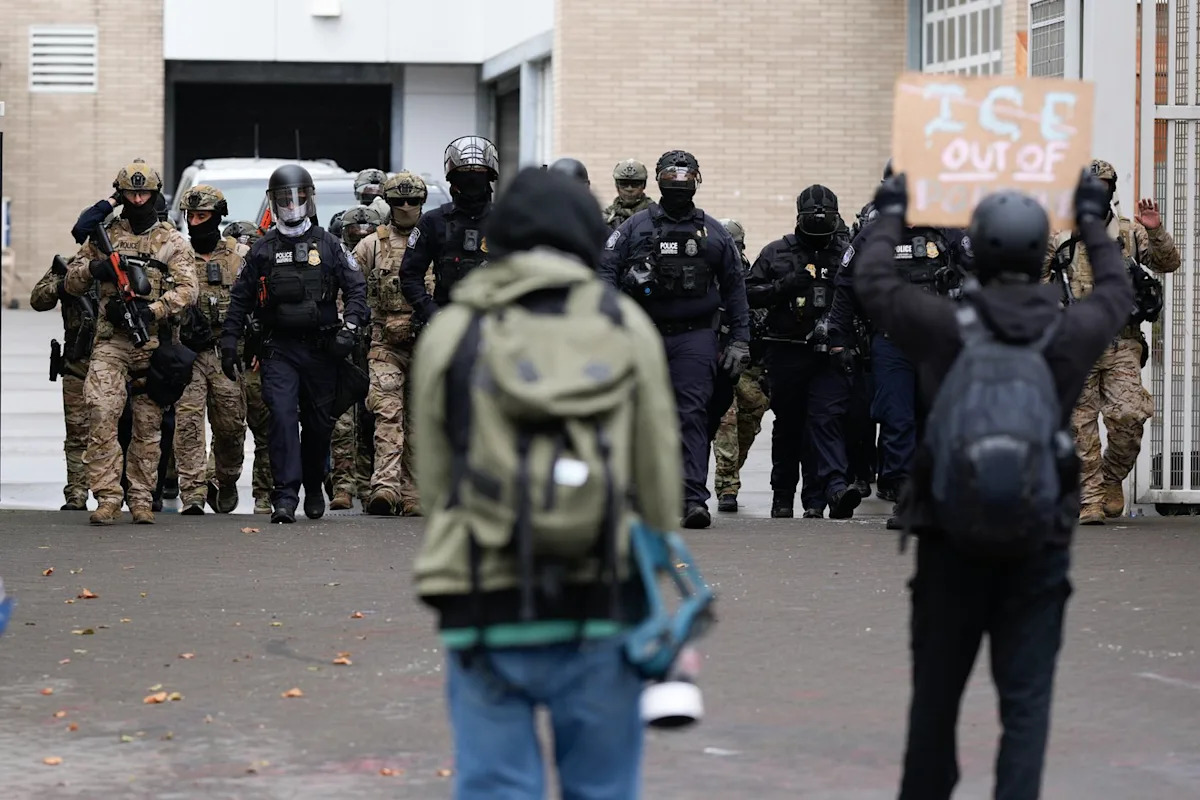PORTLAND, Ore. (AP) — A federal judge in Oregon ruled Friday that President Donald Trump's administration has failed to meet legal requirements for National Guard deployment to Portland after the city and state sued in September to block the rollout.
The decision by U.S. District Court Judge Karin Immergut, a Trump appointee, followed a three-day trial last week in which both sides argued over whether protests at the city's Immigration and Customs Enforcement building met the conditions for domestic use of military forces under federal law.
The administration said the troops were needed to protect federal personnel and property in a city Trump called “war-torn” with “fires everywhere.”
IN 106 page opinionImmergut found that while the President was entitled to “great deference” in his decision to call in the Guard, he had no legal basis for doing so because he had not proven that there had been insurrection or danger of insurrection, or that he could not enforce the law with regular forces.
“The trial record showed that while protests outside the ICE building in Portland occurred every night between June and October 2025, beginning with a few particularly destructive days in mid-June, the protests remained peaceful, with only isolated and sporadic incidents of violence,” Immergut wrote. “The occasional interference with federal officials was minimal, and there is no evidence that these small protests significantly interfered with the enforcement of any immigration laws.”
The White House did not immediately respond to a request for comment.
“The courts are holding this administration accountable to the truth and the rule of law,” Oregon Attorney General Dan Rayfield said in an emailed statement. “From the beginning, this case has been about letting facts, not political whims, determine how the law is applied. Today's decision upholds that principle.”
Democratic cities fight back
Democratic cities targeted by Trump for military intervention include Chicago, which filed a separate lawsuit on the issue. pushed away. They argue that the president has not met the legally required threshold for deploying troops and that doing so would violate the sovereignty of states.
In early October, Immergut issued two orders that blocked the deployment of troops ahead of the trial. The first order prohibited Trump from using 200 Oregon National Guard members; a second, issued a day later, prohibited him from sending any state's National Guard members to Oregon after he tried to evade the first order by sending California troops instead.
Immergut called Trump's apocalyptic descriptions of Portland “just not tied to facts“
The Ninth U.S. Circuit Court of Appeals has already ruled against deploying troops pending further action by the appeals court. Immergut's trial further developed the facts of the case, which may serve as the basis for further appellate decisions.
Demonstrations at the ICE building peaked in June
Witnesses, including local police and federal officials, were questioned about law enforcement's response to overnight protests outside the city's ICE building. The demonstrations peaked in June, when Portland police declared one a riot. In the weeks leading up to Trump's National Guard announcement, demonstrations typically drew a few dozen people.
The Trump administration said it had to shuffle federal agents from other parts of the country to respond to protests in Portland, which it characterized as an “insurrection” or “danger of insurrection.”
Federal officials working in the region described staffing shortages and requests for more personnel that have yet to be fulfilled. Among them was an official of the Federal Protective Service, the Department of Homeland Security agency that provides security for federal buildings, whom the judge allowed to be sworn in as a witness under his initials R.S. for security reasons.
R.S., who said he would be one of the most knowledgeable people at DHS about security at the ICE building in Portland, said the deployment of troops would ease the strain on staff. However, he said under cross-examination that he did not request troops and that he was not consulted on the matter by either Homeland Security Secretary Kristi Noem or Trump. He also said he was “surprised” to learn of the deployment and that he disagreed with claims that Portland had burned.
Lawyers for Portland and Oregon said city police were able to respond to the protests. After the police department declared a riot on June 14, it changed its strategy and ordered officers to intervene in cases of crimes against persons and property, and the size of the crowds has decreased significantly since the end of that month, police officials said.
The ICE building closed for three weeks over the summer due to property damage, according to court documents and testimony. ICE Regional Enforcement and Deportation Director Cammilla Wamsley said her officers were working out of a different building during that period. The plaintiffs argued that this was evidence that they could continue their employment.
___
Johnson reported from Seattle. Associated Press staff writer Michelle L. Price in Palm Beach, Florida, contributed to this report.
Claire Rush and Jean Johnson, The Associated Press








